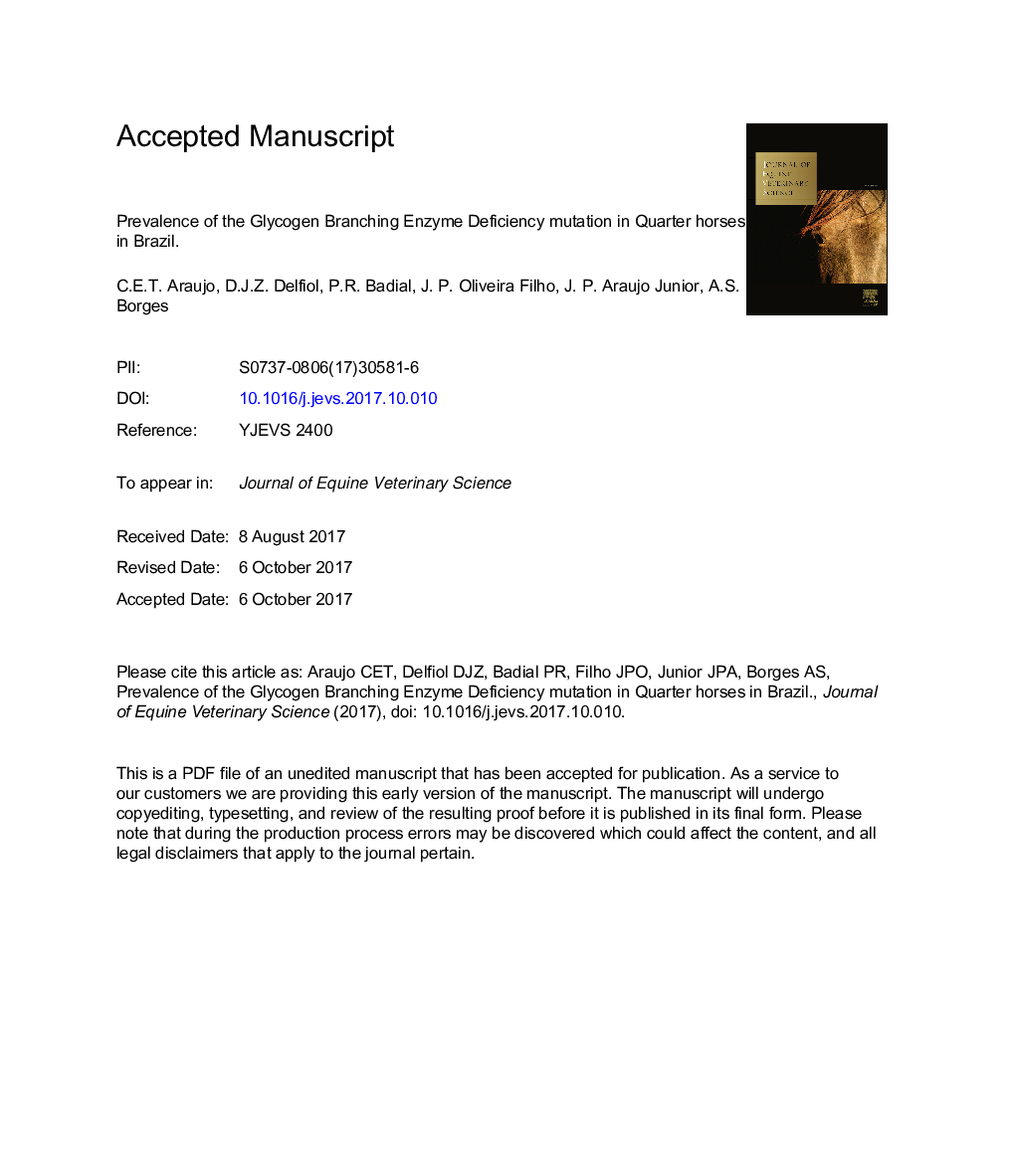| کد مقاله | کد نشریه | سال انتشار | مقاله انگلیسی | نسخه تمام متن |
|---|---|---|---|---|
| 8483225 | 1551538 | 2018 | 12 صفحه PDF | دانلود رایگان |
عنوان انگلیسی مقاله ISI
Prevalence of the Glycogen Branching Enzyme Deficiency Mutation in Quarter Horses in Brazil
ترجمه فارسی عنوان
شیوع جهش ضعیف آنزیم شاخه گلیکوژن در اسب های چهارگانه در برزیل
دانلود مقاله + سفارش ترجمه
دانلود مقاله ISI انگلیسی
رایگان برای ایرانیان
کلمات کلیدی
سقط جنین، گلیکوژن، فوم بیماری عضلانی، بیماری ارثی،
موضوعات مرتبط
علوم زیستی و بیوفناوری
علوم کشاورزی و بیولوژیک
علوم دامی و جانورشناسی
چکیده انگلیسی
Glycogen branching enzyme deficiency (GBED) is a fatal autosomal inherited disease affecting horses and caused by a nonsense mutation (c.102C>A) in the GBE1 gene. This disease strongly impairs the glycogen metabolism of affected animals resulting in abortion or early death of foals. Although understanding the prevalence of heterozygous for GBED is imperative to estimate the impact of the disease, prevalence studies have yet to be performed in Brazil. The aim of this study was to determine the prevalence of heterozygous of the GBED mutation in a population of Quarter Horses in Brazil. Blood samples were obtained from 742 animals competing in distinct disciplines including cutting, halter, race, reining, and barrel racing. All samples were submitted to DNA purification, amplification, and sequencing of the target fragment. The overall GBED prevalence of carriers was 7.95% (59/742). The prevalence of heterozygotes by discipline was considered higher in cutting (19.75% [32/162]) and reining (10% [16/160]) subgroups followed by barrel racing (5% [8/160]) and halter (3% [3/100]) horses. There were none heterozygous in the racing subgroup. These results demonstrate the GBED causative mutation in the Brazilian Quarter Horse herd and suggest the occurrence of the disease. Therefore, GBED is a disease that should be considered in the differential diagnosis of abortion and stillbirths, especially if suspect foals are products of two heterozygous. Besides testing aborted foals for the GBED mutation, the molecular diagnosis should be recommended to owners and breeders, at least for those breeding the at-most-risk subgroups of horses, to guiding their mating selections and, therefore, prevent the transmission of the mutation.
ناشر
Database: Elsevier - ScienceDirect (ساینس دایرکت)
Journal: Journal of Equine Veterinary Science - Volume 62, March 2018, Pages 81-84
Journal: Journal of Equine Veterinary Science - Volume 62, March 2018, Pages 81-84
نویسندگان
César E.T. Araujo, Diego J.Z. Delfiol, Peres R. Badial, José P. Oliveira-Filho, João P. Araujo-Junior, Alexandre S. Borges,
